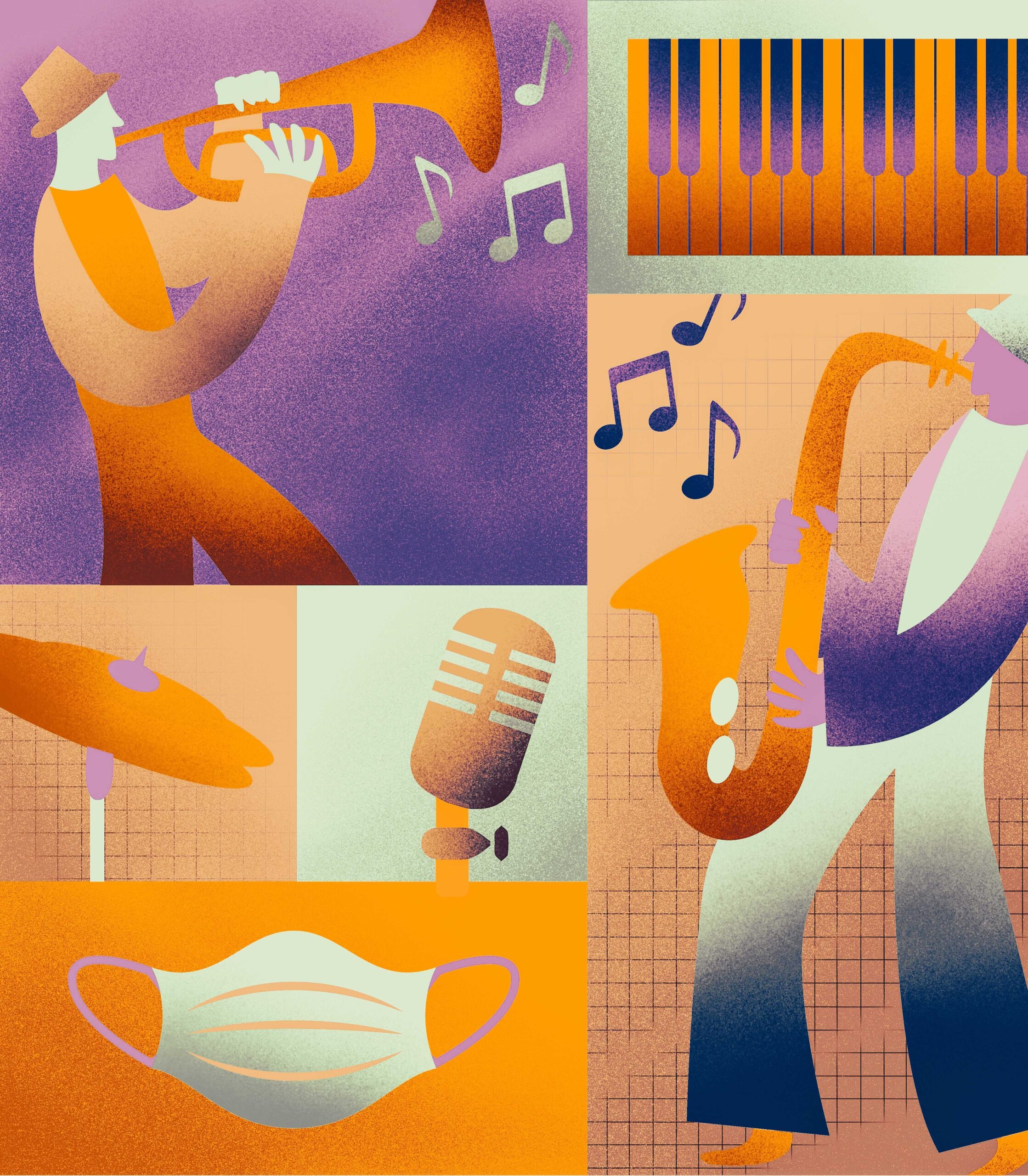On the night of December 1, 2021, eight students stood onstage in Malaspina Theatre before a backdrop of blue, purple, and pink lights. The Jazz Choir performed songs ranging from an angelically sung solo rendition of “Autumn in New York,” to an upbeat group performance of “I Got Rhythm.”
It was the second night of the VIU Music Department’s three-night Term-End Concert series, with the Jazz Choir, VIU Singers, and Big Band performing. The night before, several jazz combos had showcased their skill, and the final night featured jazz group The Skye Douglas Project, with the proceeds from the performance being donated to flood victims in Abbotsford.
The talent on stage was undeniable, but if an interested concert-goer were to visit the Music Department’s VIU webpage, they’d see a message stating that the program is currently undergoing a redesign. Student intake into the program has also been suspended for the 2022 academic year.
Department chair and saxophone, flute, clarinet, and Jazz Studies professor Ben Henriques cites “economic reasons” as the main motivator behind the redesign, with the university requiring an increased student body.
“It was a long time coming,” Henriques said. “It needed to happen. Had we been able to address it before COVID, it might have happened without [the] drastic step of closing intake.”
It was the university’s decision to stop intake into the music program in order to make sure the faculty had adequate time to work on the redesign. “But it’s COVID,” Henriques said. “The reason we didn’t do [the redesign sooner] is because we were trying to figure out how to play online. Which was horribly stressful.”
The university has set an end date of September 2023 for the completion of the redesign, but the music department is hoping to finish early and implement the new set-up in September 2022. According to Henriques, the redesign is about halfway done as of December 2021.
The goal of the redesign is to modernize the curriculum to better prepare students for careers in music. “[It’s] going to serve a wider variety of jazz musicians, or musicians in general,” said Henriques.
Right now, VIU’s music program is very jazz-focused. The redesign will open it up to other genres. There is also tentative talk of renaming the current Bachelor of Music in Jazz Studies degree to simply be a Bachelor of Music degree, similar to how Classical Music Degrees are labeled.
The current curriculum is split between jazz and classical. Henriques said the redesign will “blend” the two genres.
“The division is sometimes unhealthy,” Henriques said, addressing stereotypes of one genre of music being “better” than the other. “But they can’t really be ‘better,’ they do work together.”
The current curriculum consists of theory, ear-training, private lessons focused on the student’s preferred instrument, and ensemble work each semester.
“We’re going to try to minimize the stuff you don’t need as much [as possible] and still give them a good foundation,” Henriques said. “[Students] need to be able to engage with music on all levels. And if they can do that, whatever genre they play is really up to them.”
He also mentioned the “cyclical” learning happening outside of the classroom. Music students play together all the time, and the fourth-years end up teaching the first-years.
With intake to the program closed, some prospective first-year students missed out, but a few exceptions were made. Three “above average” students were tested and permitted to enter the second year of the program.
Henriques is still hopeful that the students unable to be accepted will continue to hone their craft.
“With music, the most important thing is practice and time,” he said. Whether they come to VIU when intake reopens, or study elsewhere, he wishes them the best. “As long as they’re successful, that’s all that matters.”
The department is already “gradually implementing” some elements of the redesign. While they haven’t yet been able to update class curriculums with set learning outcomes, they have been able to update the ensemble repertoire.
A modern setlist was on display at the Term-End Concert.
In the past, the ensembles largely stuck to jazz and classic European songs, but this year the repertoire expanded to include a reworked jazz adaptation of a song by Tyler, the Creator. Henriques said the students enjoyed it, and that’s an important measure for the success of the redesign.
“The redesign is inspired by the students,” he said. “We traditionally get a lot of people into the program, [but] the program is a little bit narrow for their focus, so then they leave. We get someone in, we get someone out. We’re trying to make something that’s not so narrow.”
Led by Rosemary Lindsay, who teaches private voice lessons and choir at VIU, the audience filtered out of the Theatre during the intermission to hear the VIU Singers in the lobby.
As she set up her sheet music, Lindsay joked that this was the first time she’d performed in a theatre lobby.
The logic behind the unconventional set-up was rooted in COVID-19 safety precautions. There were too many people in the VIU Singers to facilitate standing on stage without masks; and when masked, the sound would have been muffled in the large theatre. Instead, the masked VIU Singers gathered in Malaspina Theatre’s lobby and created what Henriques called “a beautiful blanket of sound.”
Lindsay later admitted she wasn’t sure if anyone would follow them into the lobby, but everyone did. She reflected that the optimistic message of many of the songs they performed, including one with the refrain of putting one foot in front of the other, are much needed right now.
Lindsay also led the opening jazz choir. She let her students choose the songs they performed, as well as who they’d duet with for the Term-End Concerts. “[It was] kind of like a recipe,” she said.
This open attitude can be found in all aspects of the VIU Singers. Lindsay stressed that anyone is welcome to attend her choir classes; they aren’t exclusive to Music students. She mentioned that it was the only course one student was taking at VIU.
Lindsay said that when she taught with sheet music in the past, it wasn’t as accessible as she wanted it to be. When she ditched it in favour of a call-and-response method this past semester, she observed a quick shift. Everyone was singing quickly, and looking up to the sky instead of having their noses buried in the sheets.
“In so much of schooling, there’s an idea of getting something right or wrong,” Lindsay said. “Music is a place to explore.”
Drum and percussion, small group jazz ensemble, and theory instructor Hans Verhoeven expressed a similar sentiment when he described jazz as “a big, beautiful tree.” He acknowledged its roots from West Africa to Europe, encompassing R&B, soul, neo-soul, hip-hop, and funk.
“Because it’s all connected, one is not forced to learn and study in a strictly linear fashion, which I think has been the more traditional approach,” he said.
Verhoeven said that many of the faculty have been wanting to make major improvements to the Music program for a while.
“The entire program is being redesigned, from bottom to top,” he said. “We’re proposing Music Appreciation courses, World Drumming & Body Movement ensembles, and Home Recording and Producing Courses that can be taken as electives by non-music majors.”
The faculty holds weekly redesign sessions to share research, brainstorm, and generally touch base. “It has been an intense, creative, and fascinating process—I think largely due to the passion and depth this faculty brings to Music and Music Education,” Verhoeven said.
In an ever-changing world, Verhoeven said, “it is crucial that we re-imagine what it looks like to make a career in music … I think that with Spotify [and] YouTube, more people have become disconnected with how music actually gets made and what goes into being a professional musician. It’s a daunting challenge, just to become good!”
But Verhoeven can already identify talent in his students. “Given the challenges facing us all in these times, the fact that Music students continue to push forward and refuse to abandon working toward their hopes and dreams makes them supremely cool and highly valuable people.”
The faculty have been taking student opinions into consideration during the redesign. Although the current Music students are finishing their degrees in the old style, they are still interacting with the redesign.
“They often offer me feedback and insights, and sometimes they just straight-up tell me what we should do,” Verhoeven said. “I’ve always appreciated that students seem comfortable in approaching me and offering honest, constructive feedback. I still feel more like a student than I do a teacher, and this redesign is for them.”
“I feel that the profs are really taking our comments seriously,” Drake Shoemaker, a third-year Music student who plans to be a high school band teacher, said. “I have to shout out specifically Ben Henriques, Greg Bush, and Hans Verhoeven for being open with the students about this process and making sure even students like me, who will graduate before the redesign is even implemented, get a voice in the matter at hand.”
Shoemaker would like to see more production and technology courses. “The digital world [is becoming] more and more prevalent in the creation and distribution of our art,” he pointed out.
He also suggested less weight on musical theory in favour of a year’s worth of study in different cultures and eras. He hoped for a thorough study of American, European, African, and Asian musical traditions and culture.
“Why exclusively study Mozart and Bach for three or four years when there have been thousands of other equally important creative minds from all places in the world in all periods of music?” he said.
The first of hopefully many steps towards this burgeoning cultural recognition made an appropriate showing at the Term End Concert. Henriques took a moment to acknowledge the African American roots and influence of much of the repertoire the Big Band was about to play.
The Big Band was made up of almost twenty horns and a full rhythm section. Brianna MacCrimmon, a third-year Bachelor of Jazz Studies student, played the saxophone next to Henriques. She also sang in both choirs that night.
MacCrimmon shares Shoemaker’s optimistic enthusiasm for the department redesign. “I think they’ll have a lot of success with it,” she said. “It’s going to be good.”
MacCrimmon believes the redesign will implement a comprehensive introductory class to level out students’ skill level upon entry. In the past, some first-years didn’t know how to read sheet music, whereas others had already played on tour.
Current students list a variety of reasons for why they chose the music program at VIU, but the main two reasons seem to be location and reputation. Shoemaker mentioned the “word of mouth” aspect, as his high school band teacher had attended VIU.
MacCrimmon said people from her hometown had attended VIU’s music program and that she’d observed them “heavily improving.” She looked at other post-secondary institutions, but VIU was always her first choice. When asked, she said that she’s “super happy” with the program, citing the great faculty.
The students have a high respect and appreciation for their professors, and the professors, in turn, seem committed to providing the most useful and modern curriculum with the ongoing redesign.
“The big final takeaway is just that we’re here, and we want to support people’s musical dreams and creativity,” Henriques said. “If [a student is] going to VIU and if they’re not in music, but want to do music, we want to find courses for them.”
He mentioned a Biology student who plays the saxophone in combos. “You don’t have to be a Music Major to enjoy music.”
While there is room for any instrument in VIU’s Music Department, some are apparently more in demand than others.
“Trombone players and bass players: please come!” Henriques said with a laugh.



